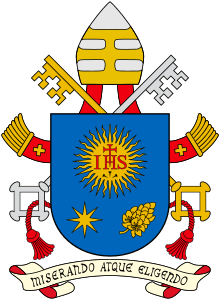Gaudete et exsultate
Gaudete et exsultate ('Rejoice and Be Glad'; from Matthew 5:12) is the third apostolic exhortation of Pope Francis, dated 19 March 2018 (the Solemnity of Saint Joseph) and published on 9 April 2018, subtitled "on the call to holiness in today's world". It addresses the universal call to holiness, with a focus "to repropose the call to holiness in a practical way for our own time".[1]
| Gaudete et exsultate Latin for 'Rejoice and Be Glad' Apostolic exhortation of Pope Francis | |
|---|---|
 | |
| Date | 19 March 2018 |
| Subject | On the call to holiness in today's world |
| Pages | 44 |
| Number | 3 of 5 of the pontificate |
| Text | |
The document is arranged in five chapters: on the call to holiness; on the heresies of Gnosticism and Pelagianism, described as "false forms of holiness"; on the Beatitudes and holiness in the Gospel; on five signs of holiness in the modern world and on spiritual combat against the Devil and discernment.
Gaudete et exsultate follows Francis's previous apostolic exhortations, Evangelii gaudium and Amoris laetitia. It is shorter, being 44 pages in length, compared to the 256 of Amoris laetitia[2] and not post-synodal (being related to a meeting of the Synod of Bishops).
The document was released by the Holy See Press Office at a press conference on 9 April 2018, the Solemnity of the Annunciation, presented by then-Archbishop Angelo De Donatis, the vicar general for Rome, Gianni Valente, a journalist and Paola Bignardi, of Azione Cattolica (Catholic Action). It was also published in Arabic, in French, in German, in Italian, in Polish, in Portuguese and in Spanish, alongside English.
A few weeks earlier, the Congregation for the Doctrine of the Faith released a letter to Catholic bishops, titled Placuit Deo ('It Pleased God'), "on certain aspects of Christian salvation", which anticipated the central theme of Gaudete et exsultate, describing the modern forms of Pelagianism and of Gnosticism. It was approved by Francis on 16 February, signed by the Congregation's prefect, Archbishop Luis Francisco Ladaria Ferrer, on 22 February (the Feast of the Chair of Saint Peter) and released at a Vatican press conference on 1 March.[3][4]
References
- "Pope Francis offers practical steps to holiness in new exhortation". Catholic Herald. 9 April 2018. Retrieved 9 April 2018.
- San Martín, Inés (9 April 2018). "In Gaudete et Exsultate , Pope answers 'Amoris' critics: Don't 'reduce, constrict' Gospel". Crux. Retrieved 9 April 2018.
- McElwee, Joshua J. (1 March 2018). "Vatican's doctrinal office warns bishops against individualistic practices of faith". National Catholic Reporter. Retrieved 25 April 2018.
- Congregation for the Doctrine of the Faith (22 February 2018). "Letter Placuit Deo To the Bishops of the Catholic Church On Certain Aspects of Christian Salvation". Holy See Press Office. Retrieved 25 April 2018. Cite journal requires
|journal=(help)